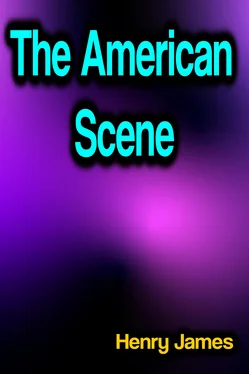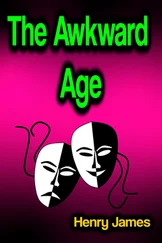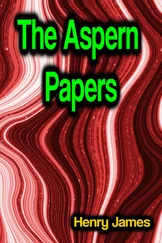Henry James - The American Scene
Здесь есть возможность читать онлайн «Henry James - The American Scene» — ознакомительный отрывок электронной книги совершенно бесплатно, а после прочтения отрывка купить полную версию. В некоторых случаях можно слушать аудио, скачать через торрент в формате fb2 и присутствует краткое содержание. Жанр: unrecognised, на английском языке. Описание произведения, (предисловие) а так же отзывы посетителей доступны на портале библиотеки ЛибКат.
- Название:The American Scene
- Автор:
- Жанр:
- Год:неизвестен
- ISBN:нет данных
- Рейтинг книги:3 / 5. Голосов: 1
-
Избранное:Добавить в избранное
- Отзывы:
-
Ваша оценка:
- 60
- 1
- 2
- 3
- 4
- 5
The American Scene: краткое содержание, описание и аннотация
Предлагаем к чтению аннотацию, описание, краткое содержание или предисловие (зависит от того, что написал сам автор книги «The American Scene»). Если вы не нашли необходимую информацию о книге — напишите в комментариях, мы постараемся отыскать её.
The American Scene — читать онлайн ознакомительный отрывок
Ниже представлен текст книги, разбитый по страницам. Система сохранения места последней прочитанной страницы, позволяет с удобством читать онлайн бесплатно книгу «The American Scene», без необходимости каждый раз заново искать на чём Вы остановились. Поставьте закладку, и сможете в любой момент перейти на страницу, на которой закончили чтение.
Интервал:
Закладка:
I speak of my keeping back, for the present, many of my ultimate perceptions, but I may none the less recall my having had, all the season, from early, the ring in my ears of a reply I had heard made, on the spot, to a generous lady offering entertainment to a guest, a stranger to the scene, whose good impression she had had at heart. "What kind of people should I like to meet? Why, my dear madam, have you more than one kind?" At the same time that I could remember this, however, I could also remember that the consistently bourgeois fathers must themselves in many cases have had mothers whose invitation to their male offspring to clutch at their relatively finer type had not succeeded in getting itself accepted. That constituted a fatal precedent, and it would have to be in the female offspring, probably, that one should look for evidences of the clutching—an extension of the inquiry for which there was plenty of time. What did escape from submersion, meanwhile, as is worth mentioning, was the golden state of being reminded at moments that there are no such pleasure-giving accidents, for the mind, as violations of the usual in conditions that make them really precarious and rare. As the usual, in our vast crude democracy of trade, is the new, the simple, the cheap, the common, the commercial, the immediate, and, all too often, the ugly, so any human product that those elements fail conspicuously to involve or to explain, any creature, or even any feature, not turned out to pattern, any form of suggested rarity, subtlety, ancientry, or other pleasant perversity, prepares for us a recognition akin to rapture. These lonely ecstasies of the truly open sense make up often, in the hustling, bustling desert, for such "sinkings" of the starved stomach as have led one too often to have to tighten one's aesthetic waistband.
Chapter
9
All of which is sufficiently to imply, again, that for adventurous contemplation, at any of the beguiled hours of which I pretend here but to give the general happier drift, there was scarce such a thing as a variation of insistence. As every fact was convertible into a fancy, there was only an encouraged fusion of possible felicities and possible mistakes, stop-gaps before the awful advent of a "serious sense of critical responsibility." Or say perhaps rather, to alter the image, that there was only a builded breakwater against the assault of matters demanding a literal notation. I walked, at the best, but on the breakwater—looking down, if one would, over the flood of the real, but much more occupied with the sight of the old Cambridge ghosts, who seemed to advance one by one, even at that precarious eminence, to meet me. My small story would gain infinitely in richness if I were able to name them, but they swarmed all the while too thick, and of but two or three of them alone is it true that they push their way, of themselves, through any silence. It was thus at any rate a question—as I have indeed already sufficiently shown—of what one read into anything, not of what one read out of it; and the occasions that operated for that mild magic resolve themselves now into three or four of an intrinsic colour so dim as to be otherwise well-nigh indistinguishable. Why, if one could tell it, would it be so wonderful, for instance, to have stood on the low cliff that hangs over the Charles, by the nearer side of Mount Auburn, and felt the whole place bristle with merciless memories? It was late in the autumn and in the day—almost evening; with a wintry pink light in the west, the special shade, fading into a heartless prettiness of grey, that shows with a polar chill through the grim tracery of November. Just opposite, at a distance, beyond the river and its meadows, the white face of the great empty Stadium stared at me, as blank as a rising moon—with Soldiers' Field squaring itself like some flat memorial slab that waits to be inscribed. I had seen it inscribed a week or two before in the fantastic lettering of a great intercollegiate game of football, and that impression had been so documentary, as to the capacity of the American public for momentary gregarious emphasis, that I regret having to omit here all the reflections it prompted.
They were not, however, what was now relevant, save in so far as the many-mouthed uproar they recalled was a voice in the more multitudinous modern hum through which one listened almost in vain for the sound of the old names. One of these in particular rose to my lips—it was impossible to stand there and not reach out a hand to J.R.L. as to a responsive personal presence, the very genius of the spot, who had given it from so early the direct literary consecration without which even the most charming seats of civilization go through life awkwardly and ruefully, after the manner of unchristened children. They lack thus, for the great occasions, the great formal necessities, their "papers." It was thanks to Lowell even more immediately than to Longfellow that Cambridge had its papers—though if I find myself putting that word into the past tense it is perhaps because of the irresistible admonition, too (proceeding so from a thousand local symptoms), that titles embodied in literary form are less and less likely, in the Harvard air, to be asked for. That is clearly not the way the wind sets: we see the great University sit and look very hard, at blue horizons of possibility, across the high table-land of her future; but the light of literary desire is not perceptibly in her eye (nothing is more striking than the recent drop in her of any outward sign of literary curiosity); precisely for which reason it was, doubtless, in part, that the changed world seemed reflected with a certain tragic intensity even in faces ever so turned to cheerful lights as those of my two constructive companions.
I had passed high, square, sad old Elmwood on the way to my cliff over the Charles, and had wonderingly lingered a little about it. I had passed Mr. Longfellow's immemorial, historical, admired residence, still ample and symmetrical and visibly tourist-haunted (the only detected ruffle of its noble calm); elements of the picture that had rekindled for an hour the finer sensibility, the finer continuity and piety. It was because of these things, again, that I felt the invoked pair beside me presently turn away, as under a chill, from that too spectral (in its own turn) stare of the Stadium—perceived as a portent of the more roaring, more reported and excursionized scene; and in particular seemed to see J.R L.'s robust humour yield to the recognition of the irony of fate, dear to every poet, in one of its most pointed forms. That humour had played of old, charmingly, over the thesis that Cambridge, Mass., was, taken altogether, the most inwardly civilized, most intimately humane, among the haunts of men; whereby it had committed itself, this honest adventurer, to a patient joy in the development of the genius loci, and was therefore without provision, either of poetry or of prose, against the picture of proportions and relations overwhelmingly readjusted. If the little old place, with its accessible ear, had been so brave, what was the matter with the big new one, going in, as it would itself say, for greater braveries still? Nothing, no doubt, but that the possession of an ear would be ceasing to count as an advantage. In what produced form, for instance, if he had been right, was now represented the love of letters of which he had been so distinguished an example? If he had on the other hand not been right—well, it would all be rather dreadful. Such, at all events, may be the disconcertments of a revisiting spirit—when he has happened to revisit too ingenious an old friend.
The old friend moreover had meanwhile had, and in relation to this large loose fringe of the town, there so freely disposed, one of his very own disconcertments; he had turned his steps, for the pleasure of memory, to Fresh Pond, dear to the muses of youth, the Sunday afternoons of spring, and had to accept there his clearest vision perhaps of the new differences and indifferences. The little nestling lake of other days had ceased to nestle; there was practically no Fresh Pond any more, and I seemed somehow to see why the muses had fled even as from the place at large. The light flutter of their robes had surrounded far-away walks and talks: one could at this day, on printed, on almost faded pages, give chapter and verse for the effect, audible on the Sunday afternoons, of their habit of murmurous hinted approval. Other things had come by makeweight; the charming Country Club on toward Watertown, all verandahs and golf-links and tennis-lawns, all tea and ices and self-consciousness; and there had come, thereabouts too, the large extension of the "Park System," the admirable commissioners' roads that reach across the ruder countryside like the arms of carnivorous giants stretching over a tea-table of blackberries and buns. But these things were in the eternal American note, the note of the gregarious, the concentric, and pervaded moreover by the rustle of petticoats too distinguishable from any garment-hem of the sacred nine. The desecrated, the destroyed resort had favoured, save on rare feast-days, the single stroll, or at the worst the double, dedicated to shared literary secrets; which was why I almost angrily missed, among the ruins, what I had mainly gone back to recover—some echo of the dreams of youth, the titles of tales, the communities of friendship, the sympathies and patiences, in fine, of dear W. D. H.
Читать дальшеИнтервал:
Закладка:
Похожие книги на «The American Scene»
Представляем Вашему вниманию похожие книги на «The American Scene» списком для выбора. Мы отобрали схожую по названию и смыслу литературу в надежде предоставить читателям больше вариантов отыскать новые, интересные, ещё непрочитанные произведения.
Обсуждение, отзывы о книге «The American Scene» и просто собственные мнения читателей. Оставьте ваши комментарии, напишите, что Вы думаете о произведении, его смысле или главных героях. Укажите что конкретно понравилось, а что нет, и почему Вы так считаете.












